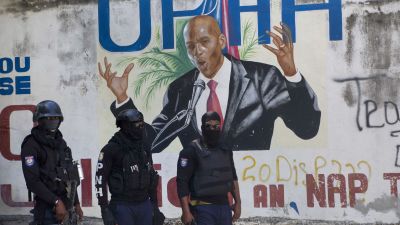Jovenel Moïse: Police shoot dead four gunmen suspected of killing Haiti president

A squad of gunmen assassinated Haitian President Jovenel Moïse and wounded his wife, with four suspects later shot dead by police.
Three police officers held hostage by the suspected gunmen were freed late on Wednesday, Leon Charles, chief of Haiti’s National Police said, while two arrests were made.
Bocchit Edmond, the Haitian ambassador to the United States, said the attack on Mr Moïse, 53, “was carried out by foreign mercenaries and professional killers – well-orchestrated”, and that they were masquerading as agents of the US Drug Enforcement Administration.
The DEA has an office in the Haitian capital to assist the government in counter-narcotics programmes, according to the US Embassy.
Interim prime minister Claude Joseph added that the heavily armed gunmen spoke Spanish or English, but gave no further details.
He said the police and military were in control of security in Haiti, where authorities have declared a “state of siege” and shut the international airport.
The normally bustling streets of the capital, Port-au-Prince, were empty on Wednesday.
Instead, sporadic gunshots could be heard in the distance and public transportation was scarce as some people searched for businesses that were open for food and water.
Mr Joseph called for an international investigation into the assassination.
Mr Moïse’s wife, Martine, was in stable but critical condition and was being moved to Miami for treatment, Mr Edmond confirmed in Washington.
Haiti has asked the US government for assistance with the investigation, he said, adding that the assassins could have escaped over the land border to the Dominican Republic or by sea.
The Dominican Republic said it was closing the border and reinforcing security in the area, describing the frontier as “completely calm”.
The killing of Mr Moïse has threatened more turbulence for a country already enduring gang violence, soaring inflation and protests of his increasingly authoritarian rule.